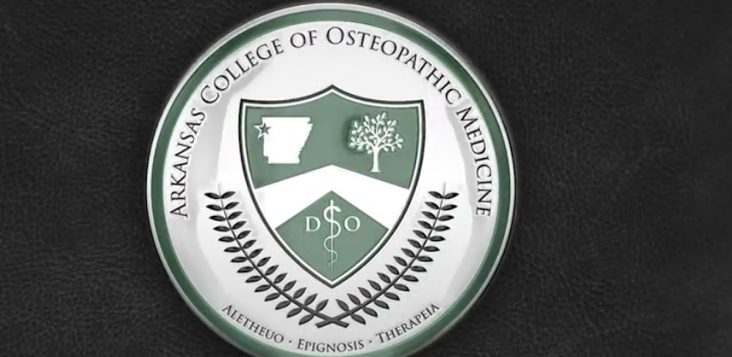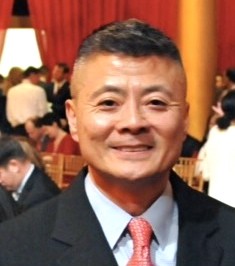ACHE hires president, CEO Parker to focus on ‘big picture’ work
by May 15, 2019 5:43 pm 3,081 views

Brian Kim has been hired as president of the Arkansas Colleges of Health Education (ACHE), a move geared to allow CEO Kyle Parker time to focus on “big picture projects” that include a possible third academic building and program, and a multi-million dollar performing arts venue that meets the college’s wellness mission.
Kim, an attorney who is set to begin with the college on June 1, has more than 20 years of academic experience and has held teaching positions at the University of Baltimore School of Law, University of Maryland School of Law, and George Mason University School of Law.
He recently worked as vice president for the Department of Accreditation and Associate General Counsel for the American Osteopathic Association (AOA), the member organization for more than 145,000 U.S. osteopathic medical doctors and osteopathic medical students. That job also included his role as secretary to the Commission on Osteopathic College Accreditation (COCA), the accrediting agency for all osteopathic medical schools.
“I am thrilled to announce that we have hired Brian Kim to fill the role of President,” Parker said in Wednesday’s (May 15) announcement. “We have been blessed with the opportunity to create ACHE as one of the preeminent health institutions in the country, and this is a significant step taken toward that end. To hire someone with Brian’s national and international recognition, talent, and experience – this isn’t just a home run; this is a grand slam!”
A native of Seoul, South Korea, Kim earned a bachelor’s degree from Tulane University and received his Juris Doctorate from Boston College Law School. Outside of work, Kim has completed 101 marathons, including the Boston Marathon and the New York City Marathon. He is also a violinist and has played with numerous orchestras, including the Chicago Citywide Symphony Orchestra and the Montgomery Philharmonic Orchestra.

“I look forward to continuing the accelerated momentum of the Arkansas Colleges of Health Education,” Kim said in the statement. “I welcome the challenge of taking ARCOM and the new programs to the next level and look forward to working with Kyle and the outstanding faculty and staff. My work with COCA required me to visit osteopathic schools around the country and in a recent COCA meeting, ARCOM was referred to as the ‘Taj Mahal of medical schools.’ I had the opportunity to visit Fort Smith and, between my love of the outdoors and the warm welcome I have received from the community, I am humbled and excited to make Arkansas my home.”
TWO MAJOR PROJECTS
Parker told Talk Business & Politics that as the college grew, it would need someone focused on daily operations and a person focused on future planning.
“I’ve enjoyed every part of it, but I’ve run for the last five years about as hard as I can run. So I went to the board and said, ‘Look, I need some day-to-day operational support,’” Parker said.
Parker’s future planning agenda includes two major projects. The first is the possible addition of a third academic building and program on the campus. The Arkansas College of Osteopathic Medicine (ARCOM) welcomed its inaugural class of 150 osteopathic medical students in August 2017, and construction is well underway on the 66,000-square-foot facility that will house the physical therapy, occupational therapy, and physician assistant degree programs.
“We have studies going on, and we’re waiting for third party results … to see what will go in building number three,” Parker said, adding that a decision could be made within the year.
The second project involves 71 acres ACHE plans to buy from the Fort Chaffee Redevelopment Authority that was once held for the Fort Smith Public School District as a site for a new high school. ACHE has offered the authority $1.2 million for the land. That property has several ideas attached to it, Parker said, with none yet definitive. One idea is to create a program “that will complement what school districts around the state are doing with STEAM (science, technology, education, arts, mathematics)” education, Parker said. It would be a “pipeline program,” Parker said, focused on encouraging junior and senior high school students to consider the medical field as an occupation.
“Not everyone has to be a physician. … But we want students in junior high and up to be acutely aware of the health profession and that it’s a great field, with 100% guaranteed employment,” he said.
The 71 acres could also be home to a performing arts center that would include a “significant” outdoor venue for concerts, theater productions and other purposes. The center and outdoor venue would be developed to “promote general wellness for people, which is part of our mission.” He said the facility would also be a quality-of-life recruitment tool for the region.
“Fort Smith needs, in my opinion, entertainment and places that really brings people in. They stay the night, eat at our restaurants, and maybe come back,” Parker said.
Studies on what to do with the 71 acres could also be wrapped up within a year, Parker said. However, he stressed that decisions on a third academic program and uses for the 71 acres are made by the ACHE board.
“We (ACHE staff) develop these ideas, but everything goes through our board. My goal is to give them several options that fit within our mission, but at the end of the day, the board decides,” Parker said.
